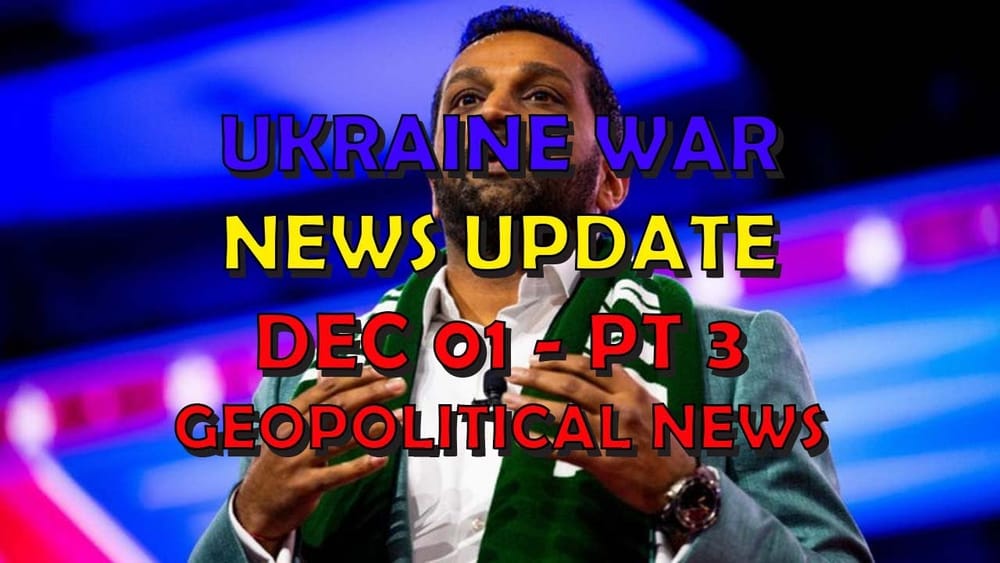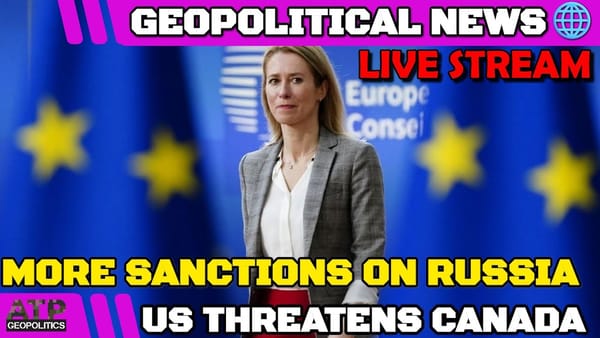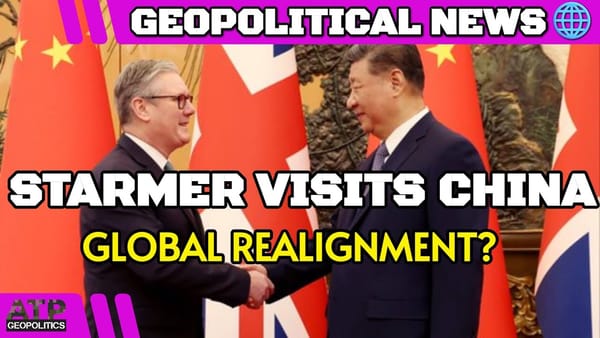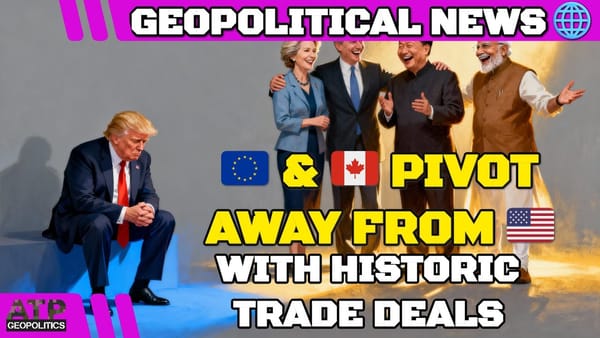Ukraine War Update NEWS: Geopolitical News
Table of Contents 📖
"For my friends, everything. For my enemies, the law."
Hello Team
🎦 00:00-00:19⏩
Jonathan welcomes viewers to another ATP Geopolitics video - the third part of the Ukraine War Update News for 1st December 2024. He has been busy putting up his Christmas decorations!
Return to top⤴️
EU-Ukraine Geopolitics
🎦 00:19-01:04⏩
Former Estonian Prime Minister, Kaya Kalas, recently visited Kyiv alongside other high-ranking EU officials, signalling strong support for Ukraine. Zelensky also had a conversation with Kalas, who now holds the position of High Representative of the EU for Foreign Affairs and Security Policy. They discussed air defence systems for Ukraine and coordinating efforts for a successful outcome.
Return to top⤴️
France: Protests and Political Commentary on Ukraine Aid
🎦 01:04-02:38⏩
- Jonathan notes that there were pro-Ukraine protests in Paris involving several hundred people.
- Conversely, approximately 500 individuals, organised by a far-right political figure, held an anti-Ukraine demonstration, opposing military aid and the deployment of French soldiers to Ukraine.
- Jonathan criticises Russian propagandists for highlighting the anti-Ukraine protest while downplaying its far-right origins.
- He expresses concern over Jean-Luc Mélenchon, the leader of the far-left La France Insoumise (LFI) party, downplaying Russia's use of anti-personnel mines and blaming the US for their presence in Ukraine.
Germany: Far-Right AFD party meeting with Putin Allies
🎦 02:38-05:08⏩
- Anton Gerashchenko has reported that German MPs from the far-right Alternative für Deutschland (AfD) party met with Putin allies in Russia.
- Three AfD MPs, all previously investigated for connections to Russia and China, travelled to Sochi in November.
- One of them, Maximilian Krauss, met with close associates of Viktor Medvedchuk, a key Putin ally.
- The associates, involved in the Voice of Europe portal, are accused of spreading pro-Russian propaganda and bribing European politicians.
- Two other AfD members, Rainer Rothfuss and Ulrich Singer, also met with Dmitry Medvedev, a former Russian prime minister.
- They allegedly sought participation in the BRICS summit, raising concerns about the AfD's interest in aligning Germany with the bloc.
- Jonathan condemns Krauss's involvement with the Kremlin and criticises the lack of scrutiny he faces in Germany.
- He finds it alarming that the AfD might be interested in Germany joining BRICS.
Blue Sky Social Media: Advantages over X
🎦 05:08-12:17⏩
- Jonathan highlights an interview with Rose Wang, the COO of Blue Sky, discussing the platform's unique features and advantages over platforms like X (formerly Twitter).
- He praises Blue Sky for its decentralised structure, making it more democratic and user-driven.
- Wang explains that Blue Sky offers user-created feeds tailored to specific interests, including filters to control content exposure.
- Jonathan expresses his preference for Blue Sky, emphasising its potential to combat disinformation, which he considers a crucial issue.
- Wang argues that Blue Sky prioritises user experience over advertiser interests, unlike other platforms.
- Jonathan quotes Wang explaining that Blue Sky's stackable moderation approach allows users to create and subscribe to custom filters, granting greater control over content.
- He contrasts this with the limited moderation options on X, highlighting Blue Sky's empowering approach to content control.
- Jonathan finds this democratic approach appealing, giving users more agency than platforms like X, where decisions are imposed.
- He cites examples of verification and impersonation issues on X, contrasting them with Blue Sky's proactive approach to these challenges.
- Jonathan emphasises Blue Sky's focus on user experience and its commitment to addressing disinformation, which he sees as prevalent on X.
- He stresses the importance of reliable information sources, explaining his reliance on social media aggregators and his reason for advocating for Blue Sky.
UK: Labour Minister Resignation Due to Fraud
🎦 12:17-14:44⏩
- Jonathan discusses the resignation of a Labour transport secretary due to fraudulent activity ten years prior involving a false claim of theft related to a company mobile phone.
- He contrasts the UK's response to this minor infraction with the tolerance for more serious allegations and convictions in other countries, particularly the US.
- Jonathan highlights a comment from Edward Hunter Crissy expressing appreciation for the UK's accountability standards.
- He laments the presence of individuals with credible sexual assault allegations and criminal convictions holding high positions in the US, citing Donald Trump as a prime example.
- Jonathan advocates for a return to prioritising morality and accountability in leadership, praising the Labour minister's resignation as a positive step.
- He expresses concern over the normalisation of criminal behaviour and lack of consequences for those in power in some countries.
Georgia: Protests Against Pro-Russian Government
🎦 14:44-19:59⏩
- Jonathan reports on ongoing protests in Tbilisi, Georgia, against the pro-Russian party that gained power through rigged elections.
- He draws parallels between these protests and the Euromaidan protests in Ukraine.
- The protests have escalated with roadblocks, clashes with security forces, and the use of fireworks against police.
- Jonathan notes the scale and intensity of the protests, describing footage of protesters using a fireworks cannon against shielded police.
- He highlights the large turnout, estimated at 200,000, and the protesters' resilience despite police crackdowns.
- Jonathan shares reports of police brutality and denial of medical services to arrested protesters.
- He mentions the Prime Minister's refusal to hold new elections despite protesters' demands.
- Jonathan praises the courage and determination of the Georgian protesters, expressing hope for a positive outcome.
- He commends the solidarity and resilience of the protesters, noting the widespread support from various groups.
Syria: Iranian Support and Rebel Activity
🎦 19:59-22:30⏩
- Jonathan shifts focus to Syria, where Iran has pledged unwavering support for the Assad regime.
- He notes Iran's Foreign Minister's visit to Damascus to convey their backing, framing it as part of a broader effort to counter regional "sinister plots".
- Jonathan describes the Syrian Arab Army (SAA) retaking areas north of Hama previously encroached upon by rebels.
- He mentions reports suggesting these areas were strategically abandoned and then retaken by the SAA.
- Rebel forces managed to penetrate the capital, Hama, but were unable to establish a foothold due to SAA redeployments.
- Jonathan reports on Iran's alleged plan to deploy Afghan Shia militias to support the Assad regime in retaking Aleppo.
- He finds this development interesting, highlighting the sectarian dynamics involved, with Iran being Shia and the rebels predominantly Sunni.
- Jonathan suggests this move reflects a heightened commitment from Iran, Russia, and Assad to quell the rebellion.
- He questions Russia's ability to contribute significantly to the Syrian conflict given their involvement in Ukraine.
- Turkish-backed Syrian rebels tearing down and burning a Russian flag from a former Russian base in Syria is cited as evidence of anti-Russian sentiment among the rebels.
- Jonathan welcomes this act of defiance, speculating on the extent of Russian losses and their waning influence in Syria.
USA: Trump's Post-Election Consultations and Controversial Appointments
🎦 22:30-33:42⏩
- Jonathan reports on Donald Trump consulting Hungary's Viktor Orbán for advice on the Ukraine war shortly after winning the US election.
- He expresses concern, interpreting Orbán's advice as likely pro-Russian and detrimental to Ukraine's interests.
- Jonathan expresses alarm over several of Trump's controversial appointments, including:
- Kash Patel, nominated as FBI Director despite being a staunch Trump loyalist with a history of attacking the FBI and promoting conspiracy theories.
- Tulsi Gabbard (unspecified role)
- Mike Hegseth (DOD)
- RFK Jr. (Health services)
- He quotes Tim Nichols's article in The Atlantic, criticising the GOP's growing disdain for federal law enforcement and highlighting Patel's suitability for undermining the FBI's missions.
- Jonathan emphasizes Patel's agreement with the January 6th insurrectionists who falsely claimed election fraud, expressing concern over his potential impact on intelligence gathering.
- He quotes General Ben Hodges, who compares Trump's approach to that of a Peruvian strongman, favouring his allies while using the law against his enemies.
- Jonathan expresses concern over Trump potentially imposing this formula on the US, calling upon Republican senators to oppose Patel's nomination.
- He quotes Shashank Joshi's analysis in The Economist, predicting significant disruption to the US intelligence community under Patel's leadership, even in an acting role.
- Jonathan further cites Joshi's concerns about Patel's intention to purge the FBI and turn its headquarters into a "museum to the deep state".
- He interprets these appointments as evidence of Trump's disregard for the US's best interests, aiming to install loyalists and undermine institutions.
- Jonathan draws a sharp contrast between the motivations of the Democrats, who he says are focused on serving the American people, and Trump, who he believes is primarily concerned with self-preservation.
- He links these developments to Ukraine's fight for democracy, highlighting the irony of the US, a supposed champion of democracy, potentially sliding toward autocracy.
- Jonathan expresses deep worry over these trends, viewing them as a threat to transparent and fair elections and the rule of law in the US.
- He questions Trump's motives for nominating individuals who appear unqualified and potentially harmful to the country's interests.
- Jonathan argues that these appointments aim to consolidate power and shield Trump and his allies from accountability.
- He stresses the danger of compromising the FBI, which plays a crucial role in law enforcement and counterintelligence, particularly concerning foreign influences.
- Jonathan expresses concern over Patel's potential disregard for investigating Russian influence and protecting US interests.
- He fears a "retribution campaign" targeting Trump's perceived enemies, drawing parallels to autocratic regimes.
- Jonathan highlights the unprecedented nature of Trump's actions, including his attempt to replace Christopher Wray, the FBI director he himself appointed, before his 10-year term ends.
- He contrasts this with the stability of previous FBI directorships, typically seen as apolitical and serving fixed terms.
- Jonathan criticises Trump's efforts to politicize the FBI, weakening its independence and integrity.
- He warns that these actions pose a serious threat to the US's democratic foundations and the rule of law, potentially emboldening adversaries like Russia and China.
USA: Charles Kushner Appointed as Ambassador to France
🎦 33:42-36:03⏩
- Jonathan reveals Trump's appointment of Charles Kushner, Jared Kushner's father and a convicted felon, as the US ambassador to France.
- He emphasizes Kushner's previous conviction for tax evasion, illegal campaign contributions, and witness tampering, highlighting Trump's 2020 pardon of him.
- Jonathan sarcastically remarks on Trump's "drain the swamp" campaign promise, contrasting it with the appointment of someone with a criminal record.
- He criticizes the blatant hypocrisy of Trump's actions, comparing them to the UK's swift removal of the Labour minister for a minor offense.
- Jonathan mocks the criteria seemingly used by Trump for appointments, suggesting they are based on personal loyalty and financial contributions rather than qualifications.
- He notes the widespread criticism of this appointment in French media, further highlighting its inappropriateness.
- Jonathan concludes this section by lamenting the state of American political nominations under Trump.
Lex Friedman's Potential Interview with Zelensky and Choice of Guests
🎦 36:03-37:26⏩
- Jonathan discusses the possibility of Lex Friedman interviewing Zelensky in Kyiv, noting that they could converse in Russian.
- He highlights Jake Broe's criticism of Friedman's guest selection, arguing that he has consistently invited individuals who have been proven wrong about Russia and Ukraine.
- Jonathan provides the example of former CIA agent Andrew Bustamante, who made inaccurate predictions about Ukraine's fall and Russia's military successes on Friedman's podcast.
- He acknowledges differing opinions on Friedman's podcast, but reiterates Broe's point about the consistent inaccuracies of his guests regarding Russia and Ukraine.
- Jonathan expresses hope that a potential interview with Zelensky could provide Friedman's audience with more accurate information about the situation in Ukraine.
Jonathan's Argument for Ukraine's Geopolitical Importance vs. Iraq and Afghanistan
🎦 37:26-43:12⏩
- Jonathan addresses a comment from a viewer who was "peed off" by his statement that Ukraine is more important to US national security than Afghanistan.
- He clarifies that he meant "geopolitically more important" and cites the significantly higher costs of the Iraq and Afghanistan conflicts compared to Ukraine.
- Jonathan argues that the geopolitical ramifications of the Ukraine conflict far outweigh those of the Iraq and Afghanistan wars.
- He lists several reasons for Ukraine's greater importance, including:
- The potential for nuclear escalation in the Ukraine conflict.
- The impact of the Ukraine war on global energy markets and the rise of BRICS.
- Russia's status as a superpower and its challenge to US hegemony, contrasting with the non-superpower status of Iraq and Afghanistan.
- The involvement of other powerful actors, such as North Korea, Iran, and China, in supporting Russia's actions in Ukraine.
- Jonathan asserts that the Ukraine conflict is the most significant global conflict since 1945 due to its wide-ranging implications.
- He addresses the emotional responses to his statement, suggesting that they reflect personal biases and psychological attachments rather than objective geopolitical analysis.
- Jonathan reiterates his stance that the Ukraine conflict is fundamentally more important than the wars in Iraq and Afghanistan from a geopolitical perspective.
Wrap Up
🎦 43:12-43:37⏩
Jonathan acknowledges that he often provokes strong reactions with his opinions, but encourages respectful discussion and debate. He thanks viewers for their support and bids them farewell.
Return to top⤴️




